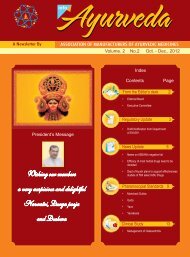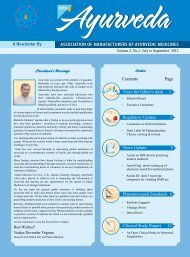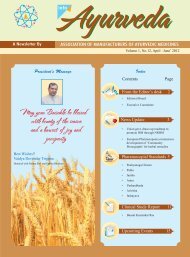3 In the Drugs and Cosmetics Rules, 1945 - amam-ayurveda.org
3 In the Drugs and Cosmetics Rules, 1945 - amam-ayurveda.org
3 In the Drugs and Cosmetics Rules, 1945 - amam-ayurveda.org
You also want an ePaper? Increase the reach of your titles
YUMPU automatically turns print PDFs into web optimized ePapers that Google loves.
12(iv) If <strong>the</strong> new drug has a potential for use in paediatric patients – paediatric studies should beconducted. These studies may be initiated at various phases of clinical development or afterpost marketing survelliance in adults if a safety concern exists. <strong>In</strong> cases where <strong>the</strong>re is limitedpaediatric data at <strong>the</strong> time of submission of application – more data in paediatric patientswould be expected after marketing authorisation for use in children is granted.(v) The paediatric studies should include -(a) (a) clinical trials,(b) (b) relative bioequivalence comparisons of <strong>the</strong> paediatric formulation with <strong>the</strong>adult formulation performed in adults, <strong>and</strong>(c) (c) definitive pharmacokinetic studies for dose selection across <strong>the</strong> ageranges of paediatric patients in whom <strong>the</strong> drug is likely to be used. Thesestudies should be conducted in <strong>the</strong> paediatric patient population with <strong>the</strong>disease under study.(vi) If <strong>the</strong> new drug is a major <strong>the</strong>rapeutic advance for <strong>the</strong> paediatric population – <strong>the</strong> studiesshould begin early in <strong>the</strong> drug development , <strong>and</strong> this data should be submitted with <strong>the</strong> newdrug application.(vii) Paediatric Subjects are legally unable to provide written informed consent, <strong>and</strong> aredependent on <strong>the</strong>ir parent(s)/ legal guardian to assume responsibility for <strong>the</strong>ir participation inclinical studies. Written informed consent should be obtained from <strong>the</strong> parent/ legal guardian.However, all paediatric participants should be informed to <strong>the</strong> fullest extent possible about <strong>the</strong>study in a language <strong>and</strong> in terms that <strong>the</strong>y are able to underst<strong>and</strong>. Where appropriate,paediatric participants should additionally assent to enrol in <strong>the</strong> study. Mature minors <strong>and</strong>adolescents should personally sign <strong>and</strong> date a separately designed written assent form.Although a participant’s wish to withdraw from a study must be respected, <strong>the</strong>re may becircumstances in <strong>the</strong>rapeutic studies for serious or life-threatening diseases in which, in <strong>the</strong>opinion of <strong>the</strong> <strong>In</strong>vestigator <strong>and</strong> parent(s)/ legal guardian, <strong>the</strong> welfare of a pediatric patientwould be jeopardized by his or her failing to participate in <strong>the</strong> study. <strong>In</strong> this situation,continued parental/ legal guardian consent should be sufficient to allow participation in <strong>the</strong>study.


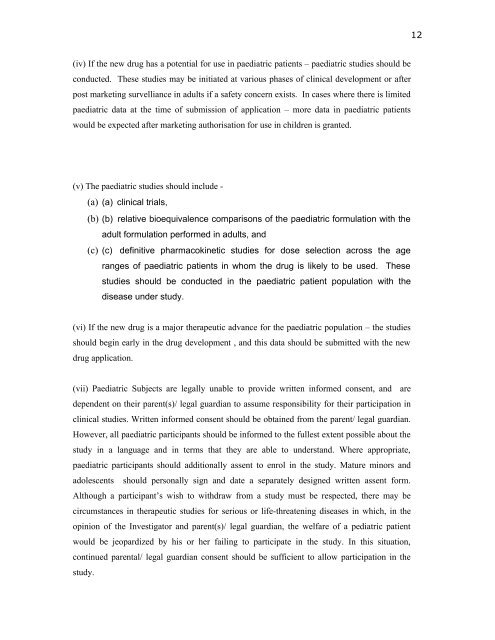

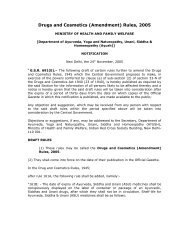
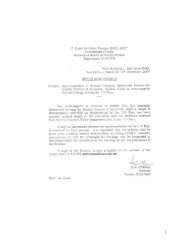

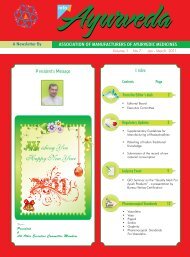
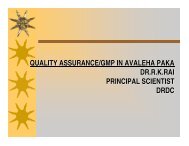
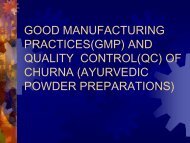
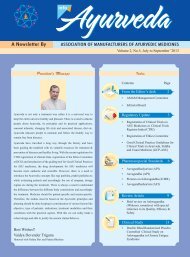
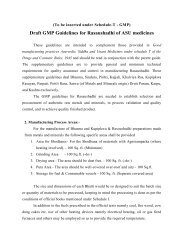
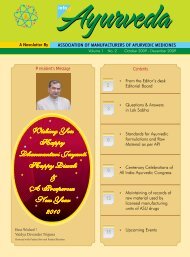
![[To be published in Gazette of India Part II Section 3, sub-section iii]](https://img.yumpu.com/28570283/1/190x245/to-be-published-in-gazette-of-india-part-ii-section-3-sub-section-iii.jpg?quality=85)
